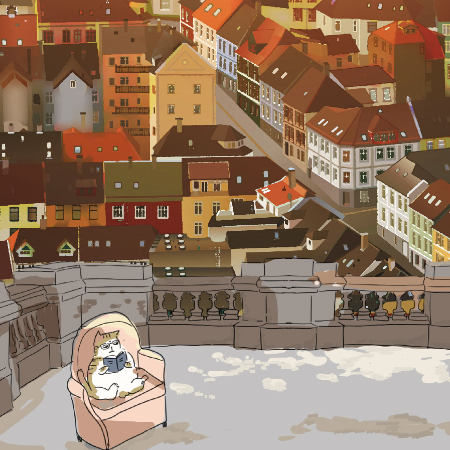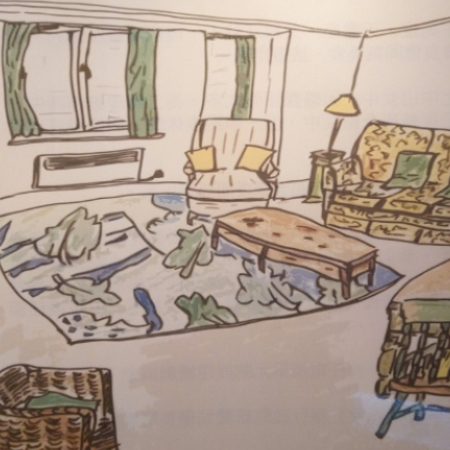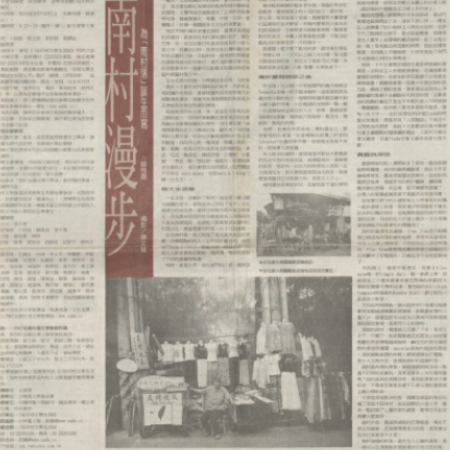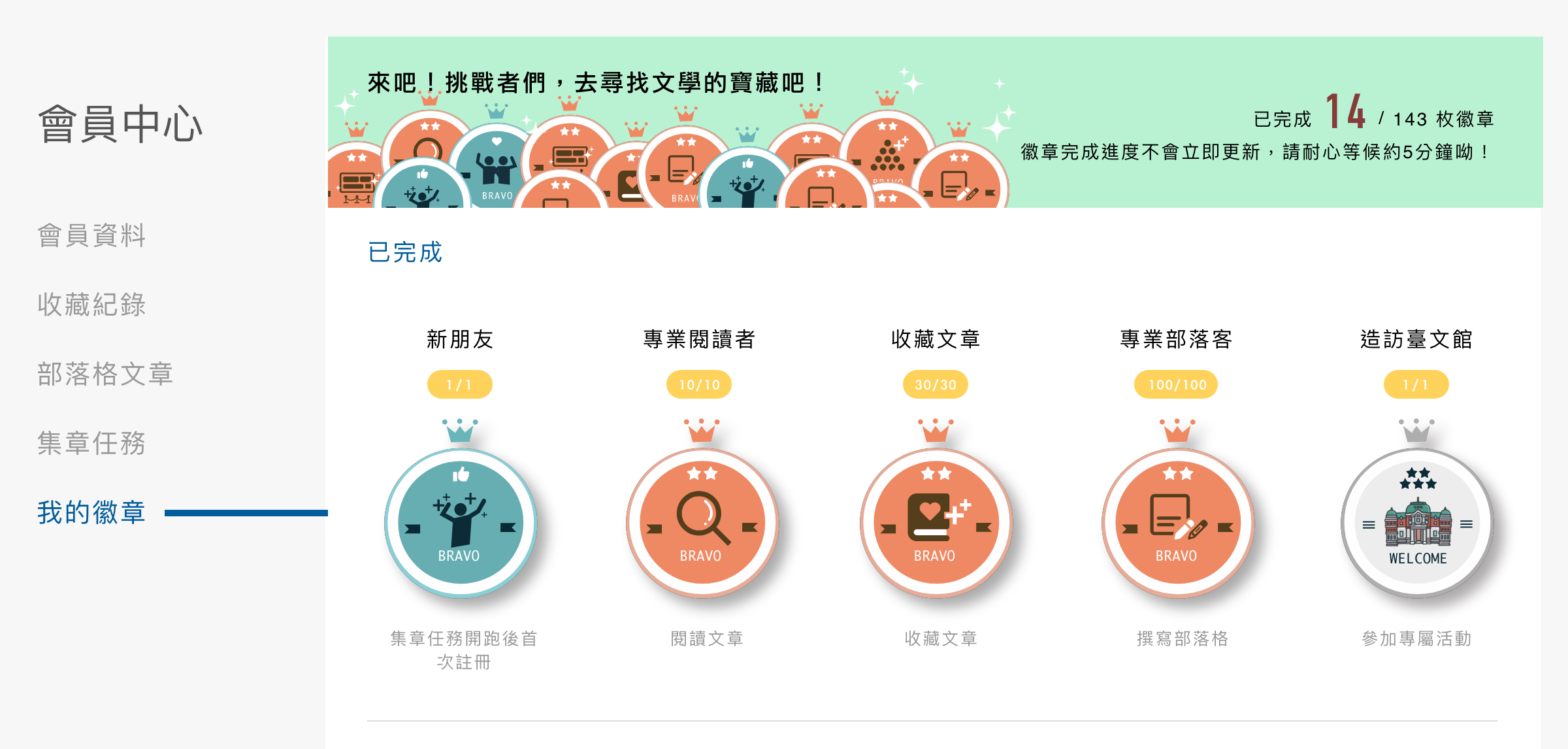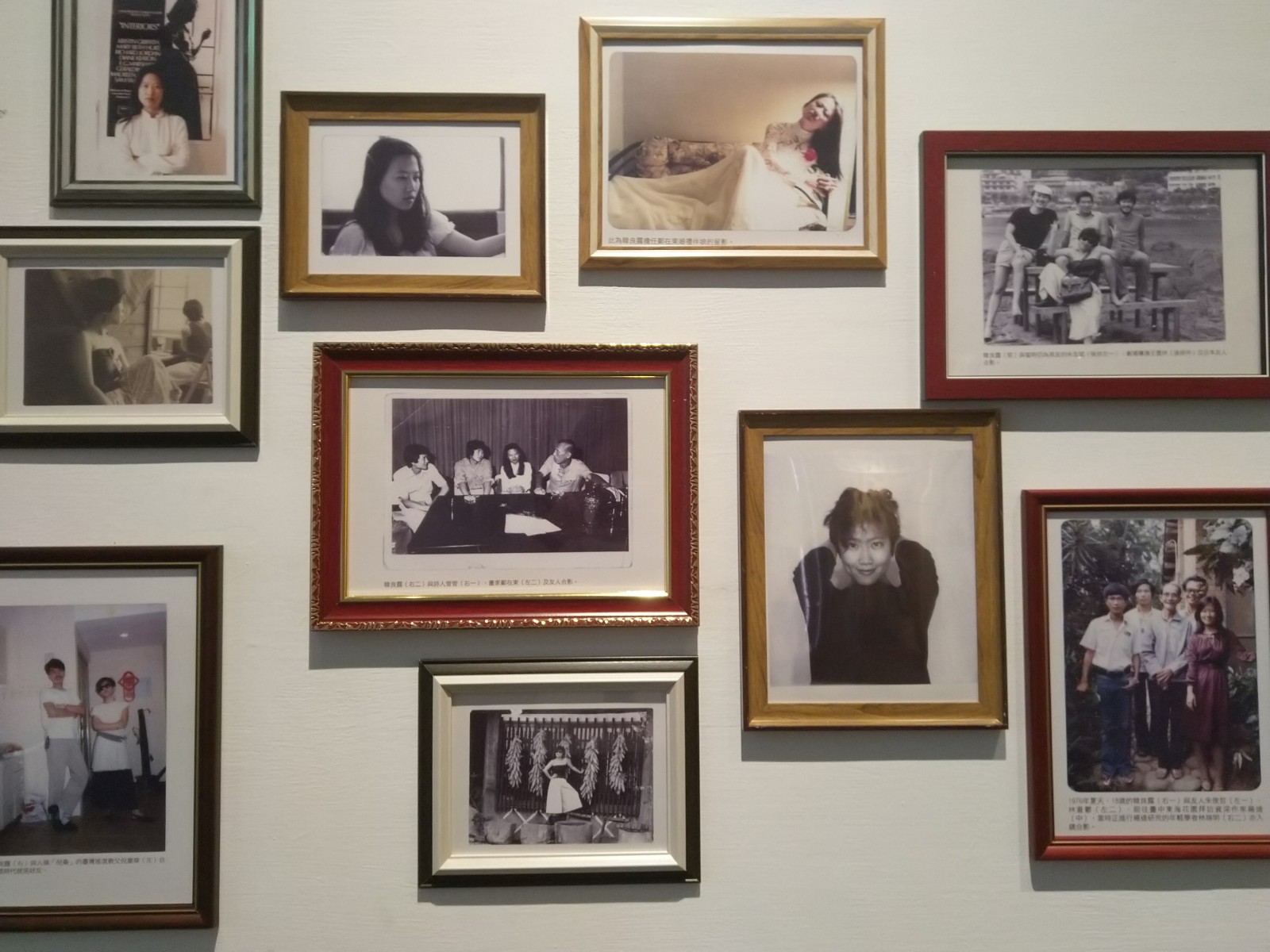
In the 1970s, Taiwan gradually shifted from a closed to an open society. Cultural and political enlightenment sparked at the same time. Liang-Lou Han, who was still in her golden years, wrote poems, held film festivals, participated in small theaters, made experimental movies, and advocated feminism. Meanwhile, she skipped classes, transferred school, and traveled around. She appeared everywhere on the streets, cafes, or tea houses, breathing free and fragrant air like a rose, leaving her name on the sand beach of the era. She was the pioneer of a cross-border and a slashie, and also a combination of a hipster and a young cynic.
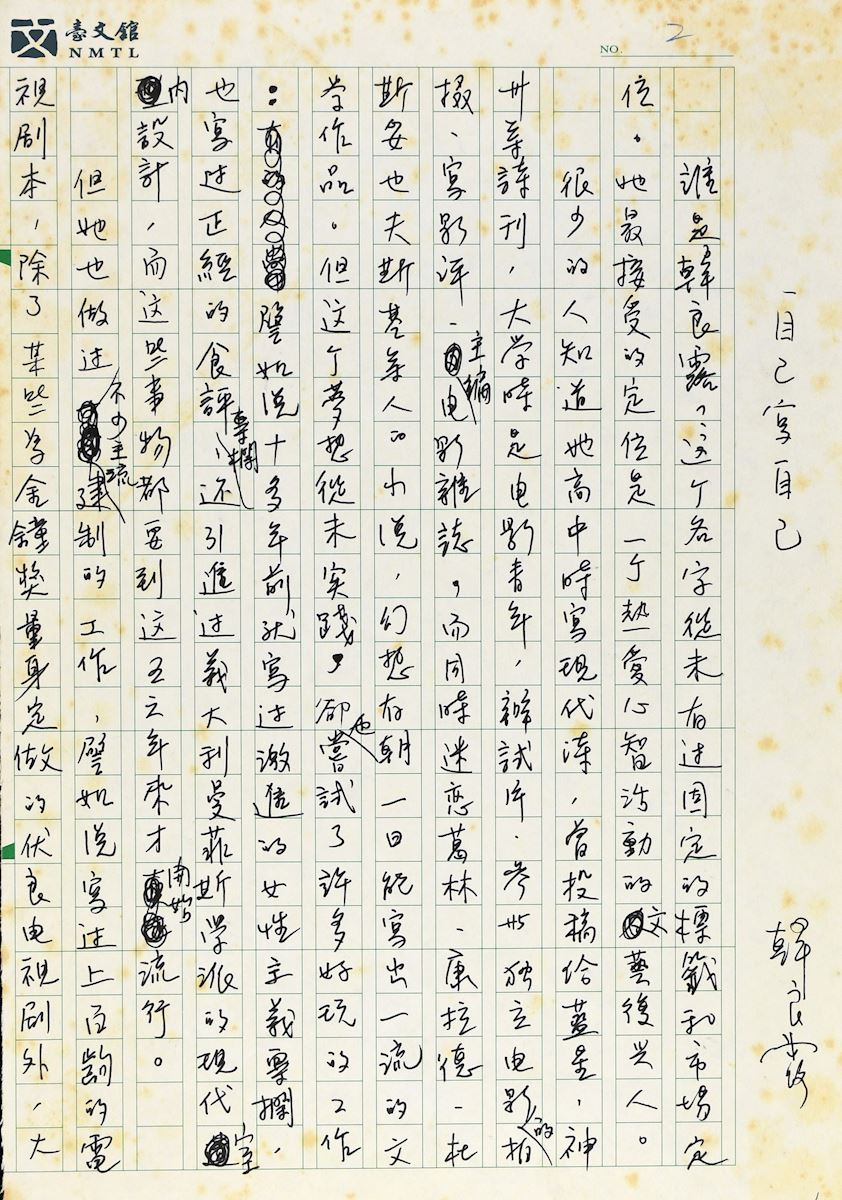
Manuscript of "Write about Myself ", donated by Chuan-Pin Chu. With a 600-word length, from a third-person perspective, and through self-examination, Liang-Lou Han detailed her journey of adventure in the mental jungle since she was young, and answered the question "Who is Liang-Lou Han?" as a "Renaissance woman who loves mental activities.
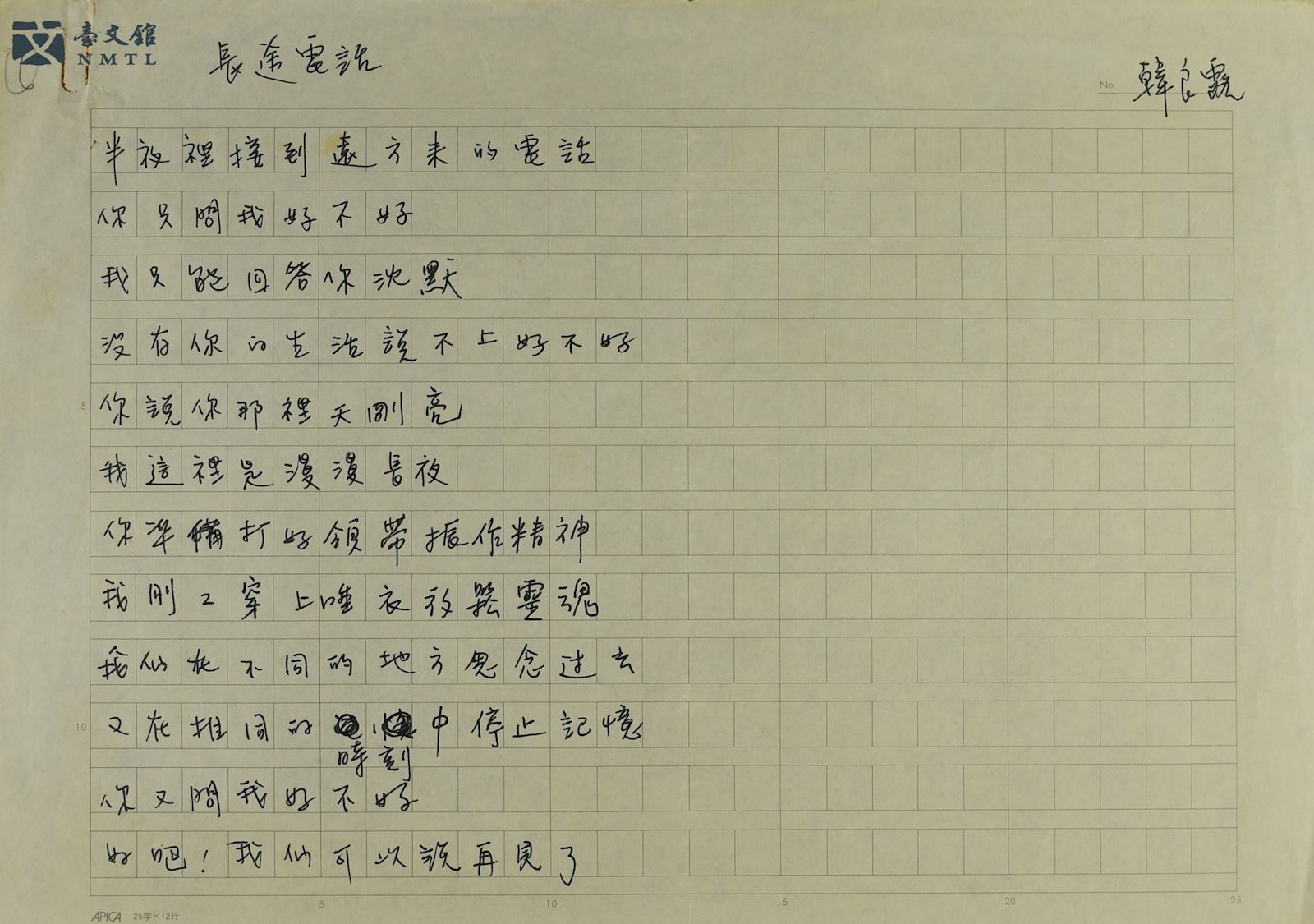
Manuscript of "Long Distance Call", donated by Chuan-Pin Chu.
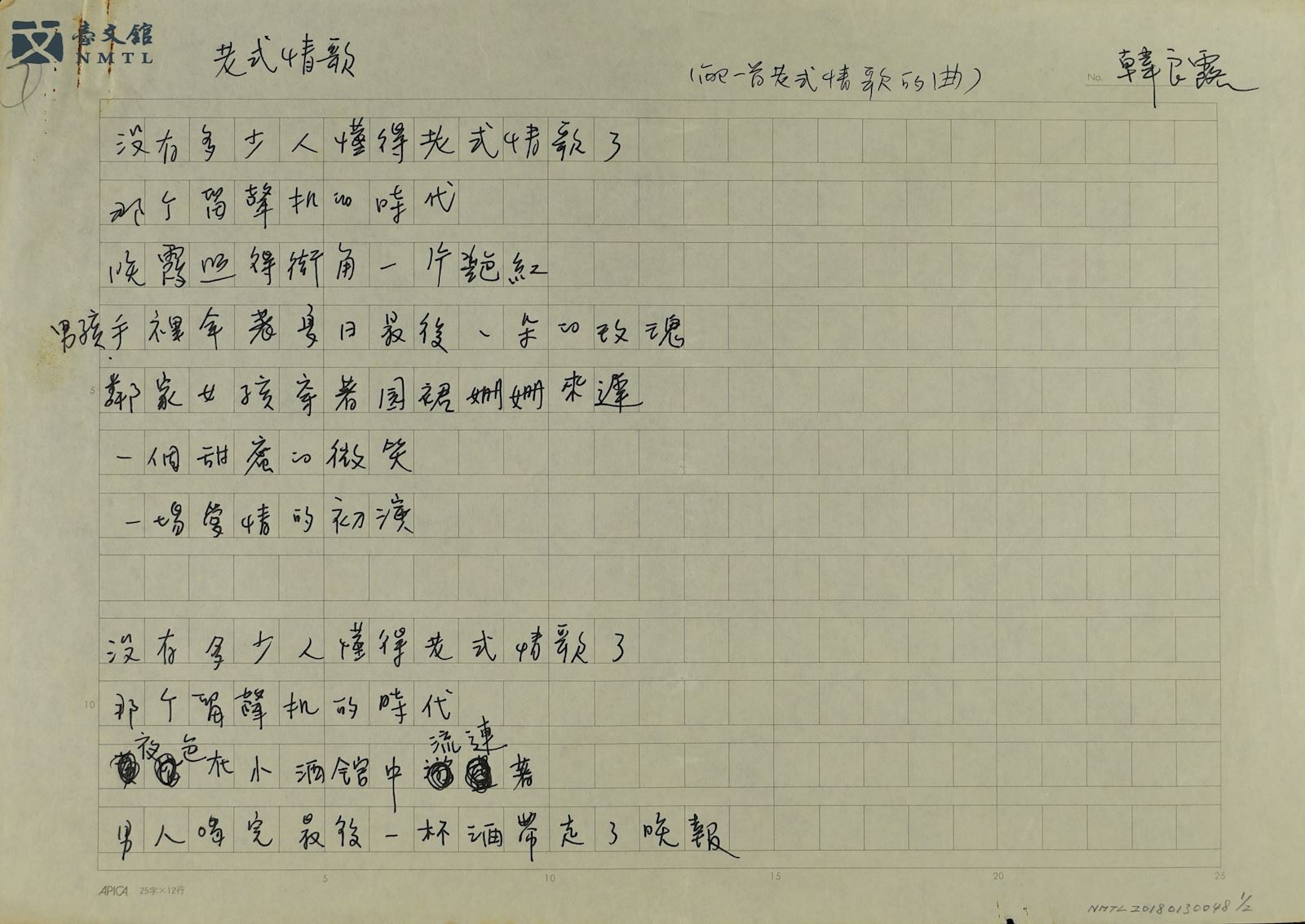
Manuscript of "Old Style Love Song", donated by Chuan-Pin Chu. Among her various forms of text creation, Liang-Lou Han also once dabbled in "lyrics".
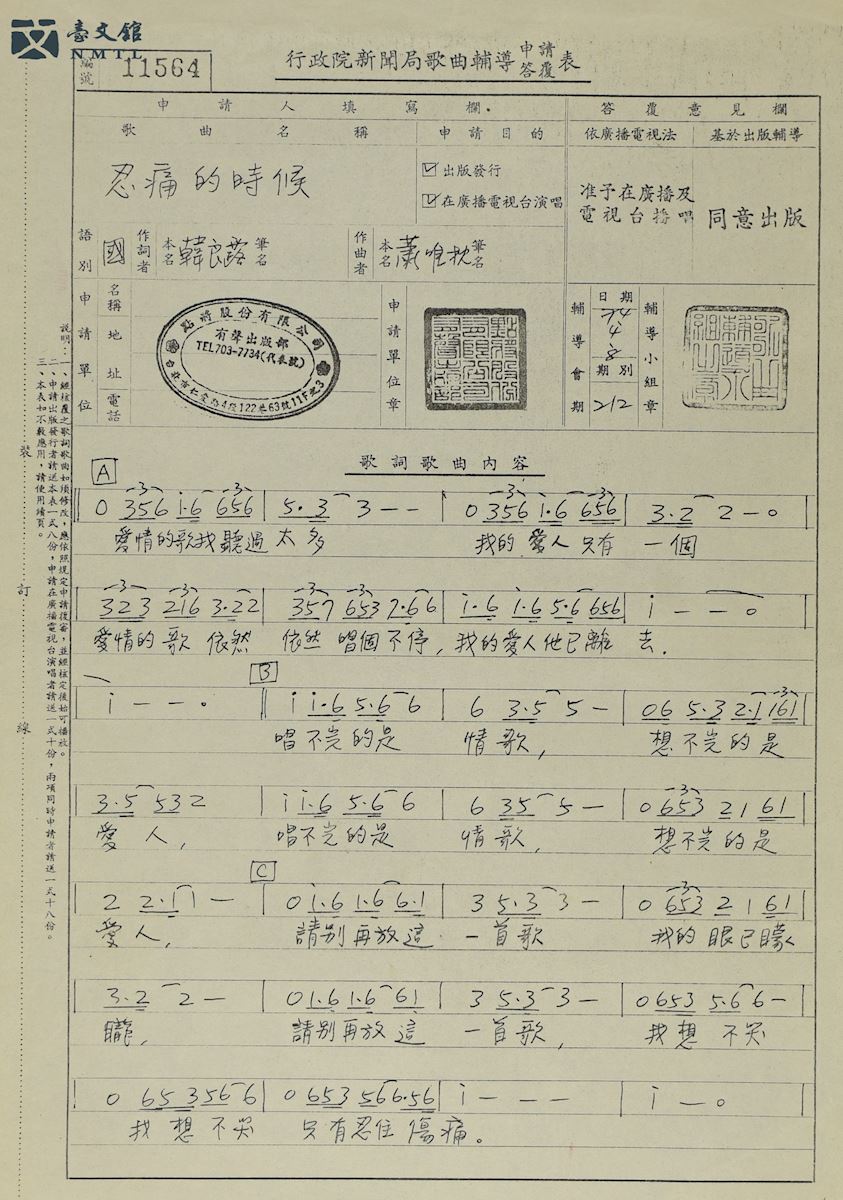
Photocopy of "Application Form for Songs Guidance by the Government Information Office, Executive Yuan", donated by Chuan-Pin Chu. In order to collect popular songs and conduct reviews, the Government Information Office established the "Broadcast, Television and Songs Guidance Group of the Government Information Office, Executive Yuan" in 1974.
With lyrics written by Liang-Lou Han and composed by Wei-Chiu Hsiao, the song "The Moment of Enduring the Pain" was "permitted to be broadcast on radio and television" and "agreed to be published" in 1985. This application form leaves a profound record for Taiwan's music history.
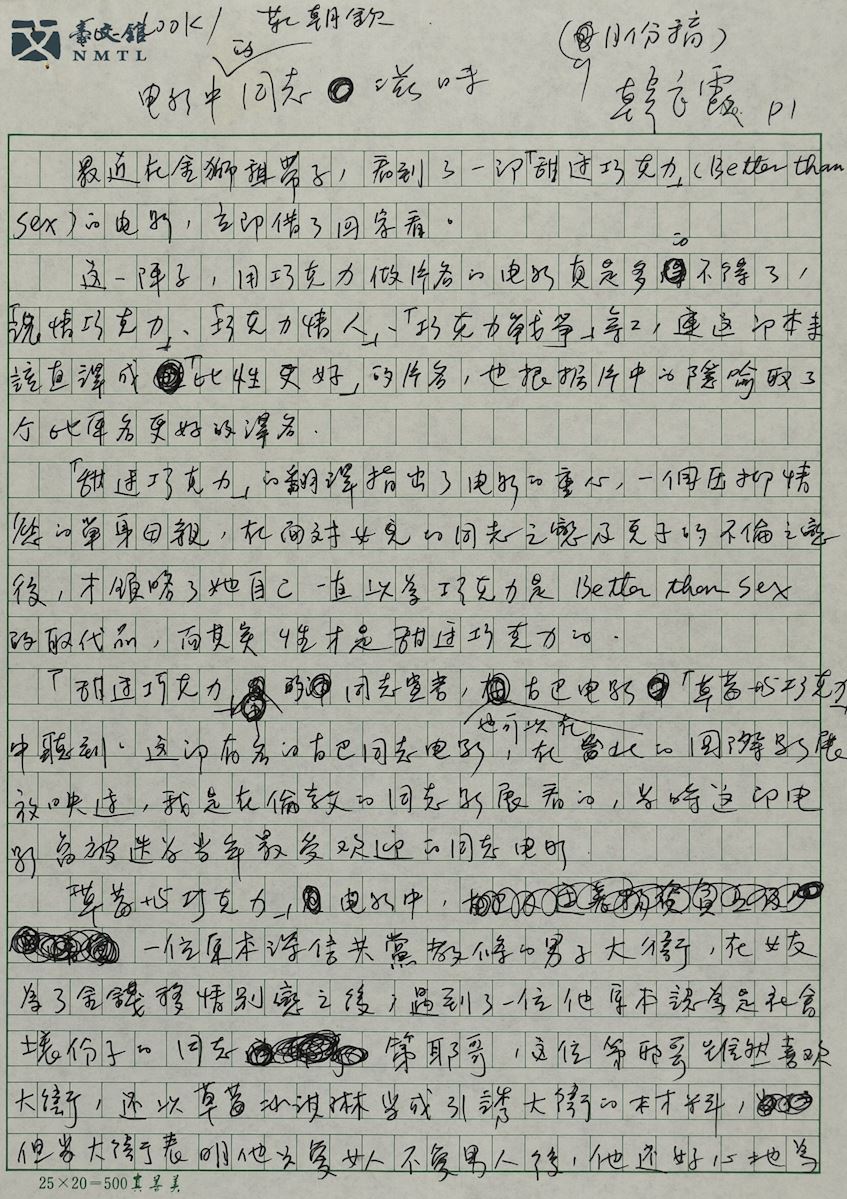
Manuscript of "Queers in the Movies", donated by Chuan-Pin Chu. Starting from "Better Than Sex", this article introduced several queer cinemas with hidden meanings of "social liberation" in succession. This article was originally published in the movie magazine Look, and was later included in the section "The Delicacy’s Culture" of the book It's Fun to Eat: The Delicacies of Liang-Lou Han and Julian.
.jpeg)
Manuscript of "There Is a Brokeback Mountain in Everyone's Heart", donated by Chuan-Pin Chu. The queer cinema Brokeback Mountain directed by Ang Lee was released in Taiwan on January 20, 2006, and Liang-Lou Han immediately published this review in the column of "San Shao Sih Chuang" in the Literary Supplement of China Times. She pointed out in the article that "Brokeback Mountain", in addition to referring to "queer love", symbolizes a place that deviates from the mainstream and "represents the wildness of life".
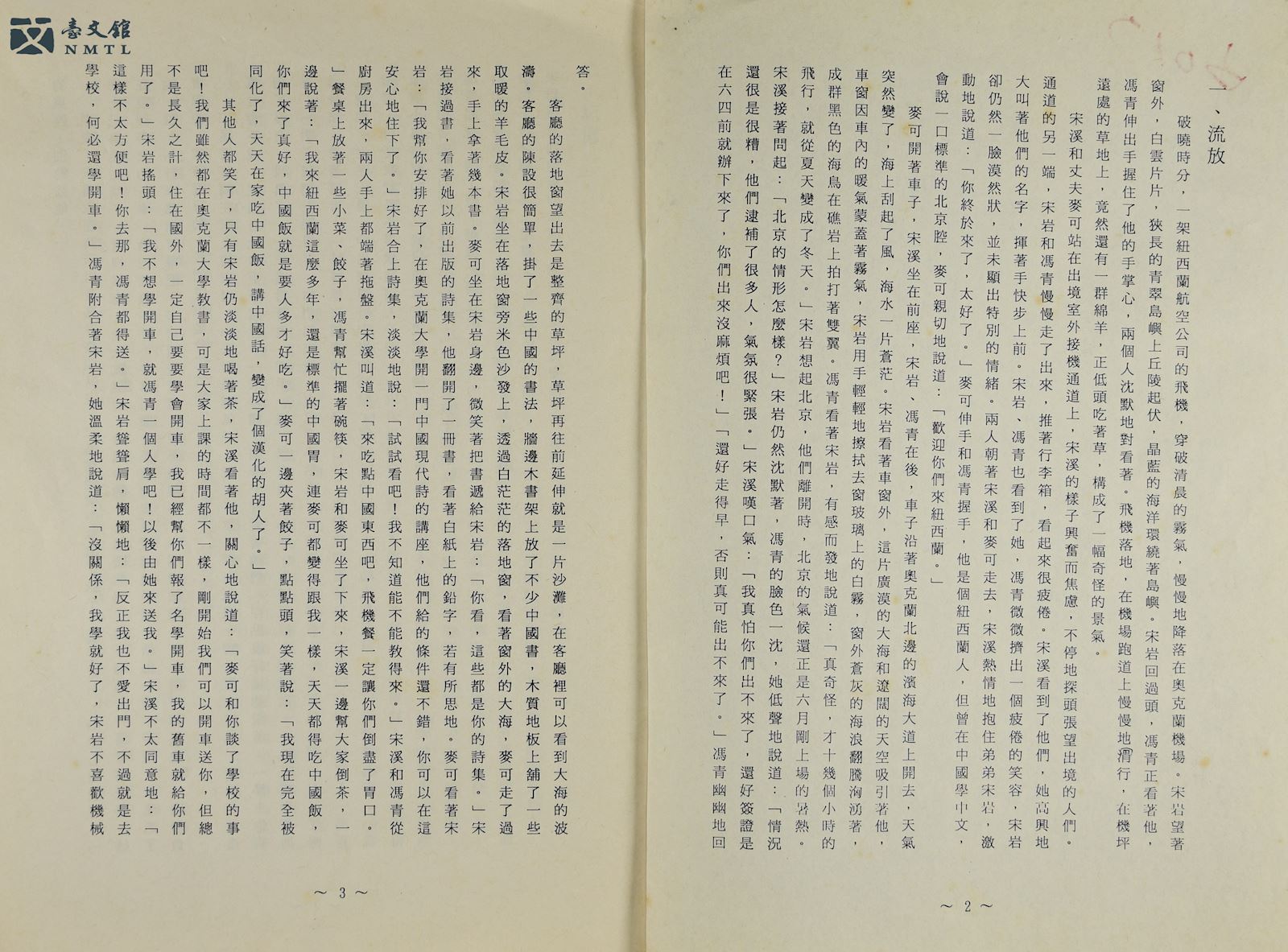
Bye Bye, Blackbird novel typescript, donated by Chuan-Pin Chu.Bye Bye, Blackbird is one of a small number of novels written by Liang-Lou Han that has lasted to this day. According to its preface, the story was based on the incident of the Chinese poet Gu Cheng who lived in New Zealand; he killed his wife and committed suicide on October 8, 1993. Liang-Lou Han tried to describe Gu Cheng's "psychological truth in life" by using the non-biographical realistic way.
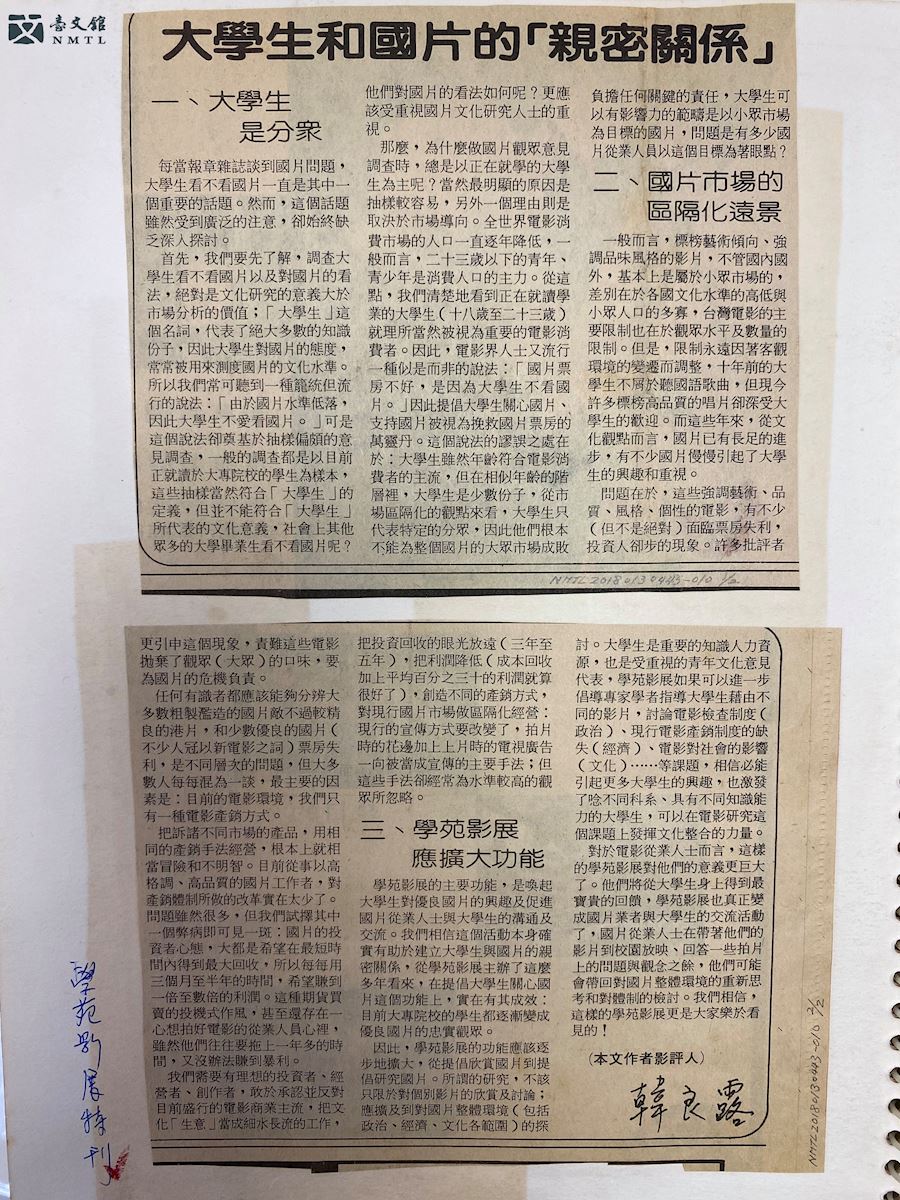
The newspaper clipping "Intimate Relationship" between College Students and Taiwanese Cinema, donated by Chuan-Pin Chu. In the early 1980s, the industry of Taiwanese cinema fell into a downturn. College students criticized Taiwanese cinema for their lack of depth. The Government Information Office and relevant departments launched the "Academy Film Festival" in 1982 and entered university campuses to encourage college students to watch Taiwanese cinema. This article is a special article written by Liang-Lou Han as a film critic and published in the "Special Issue of the Academy Film Festival".
.jpg)
The script of the first episode of the Chinese drama series Their Story, typed version, provided by Chuan-Pin Chu.The typescript of the first episode of the Chinese drama series Their Story, provided by Chuan-Pin Chu. When Liang-Lou Han was 24 years old, her father's business failure resulted in bankruptcy of her family. She took up the debt by writing TV series scripts and completed hundreds of scripts in a few years. Their Story was broadcast in June 1988, starring Hou-Ren Jiang, Shu-Jun Ni, Dan-Wei Chou, Jia-Ming Wong and others.
.jpg)
Typed filmscript Lunar Eclipse Night, provided by Chuan-Pin Chu. In addition to TV series scripts, Liang-Lou Han completed many film scripts, including My American Nephew (1986) which won the "Excellent Film Script" award from the Government Information Office, Executive Yuan, Good Girl and Bad Girl (1987), The Totem of Desire (1994) and Lunar Eclipse Night. The biggest common feature of these works is: These films were never shot.
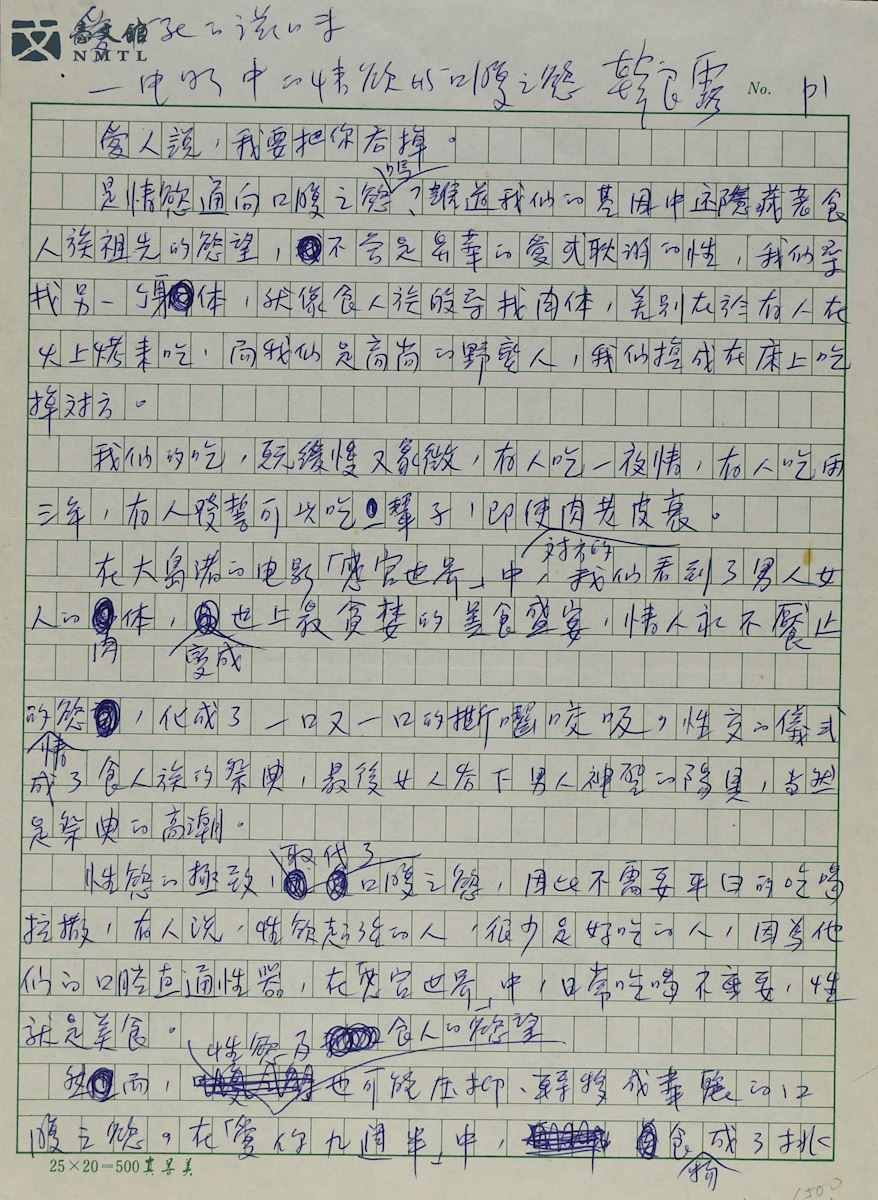
Manuscript of "The Taste of Love and Death-the Eroticism and Appetite in the Movie", donated by Chuan-Pin Chu. Liang-Lou Han analyzed the connection between eroticism and appetite from the film. Whether it is a substitution, a suppression, a transformation or a sublimation, the death of eroticism and of appetite is the realization of love. Originally published in PC Home's "Liang-Lou Han's Playful World" column, this article was later included in It's Fun to Eat: The Delicacies of Liang-Lou Han and Julian.
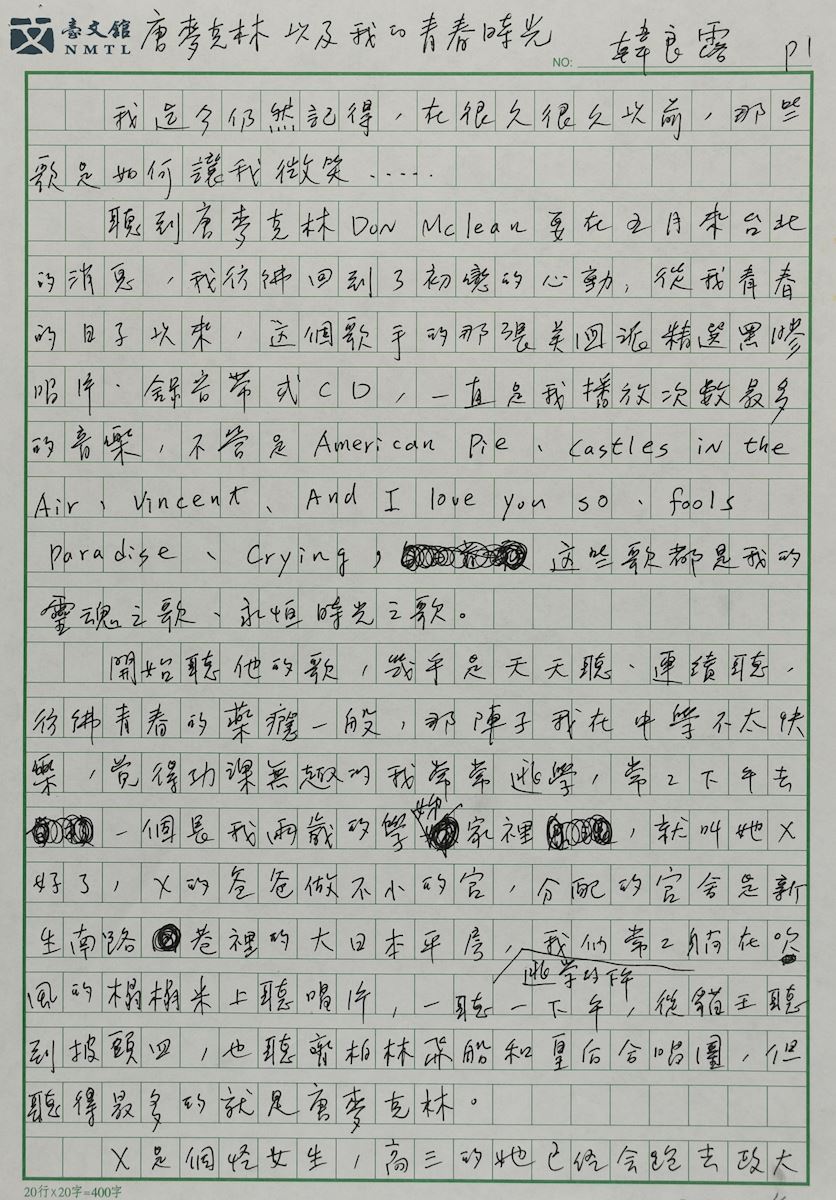
Manuscript of "Don McLean and My Youth", donated by Chuan-Pin Chu. Liang-Lou Han's youthhood was not happy. She often went to her upper classmate's home to listen to the vinyl record of "American Pie" by the American folk singer Don McLean. She thought it was her song of the soul, a timeless song. The manuscript was published in the United Daily News in 2008, and was later included in the "Cultural Terrace".
Photo of young Liang-Lou Han, provided by Chuan-Pin Chu.
.jpg)
.jpg)
.jpg)
.jpg)
.jpg)
.jpg)
.jpg)

Born in Kaohsiung, Liang-Lou Han grew up in Beitou in a wealthy and enlightened family. As the eldest daughter, she had two younger sisters and a younger brother. According to her statement, she ran away from home at the age of five to explore the world.

.jpg)


During the years from high school to university, young Liang-Lou Han was lively and outgoing, rebellious and unruly. As a young standard female hipster, she had held independent film festivals, made documentaries, participated in small theaters, and made friends in the fields of art and literature.

In the summer of 1974, 18-year-old Liang-Lu Han (first from the right) and friends Chun-Je Chu (first from the left) and Chang-Yu Lin (second from the left) went to Tung-Hai Garden in Taichung to visit the senior writer Yang Kui (middle). Rui-Ming Lin (second from the right) who was doing a study on Yang Kui at that time was also photographed together.

Liang-Lou Han (front) took a group photo with Chuan-Pin Chu (first from the left in the back row) who was still her boyfriend at the time, the theater director Mo-Lin Wang (center in the back row) and a Japanese friend.

Liang-Lou Han (second from the right) took a group photo with the poet Guan (first from the right), the painter Tsai-Tung Cheng (second from the left) and other friends.

A photo of Liang-Lou Han as the bridesmaid at Tsai-Tung Cheng's wedding.

Liang-Lou Han (right) and Chong-Hua Ni (left), Taiwanese rock godfather known as "Ni Sang", were close friends since they were young.

.jpg)
Travel-loving Liang-Lou Han determined to quit her job in her middle age with a lot of fame and fortune, and traveled around the world to visit more than sixty countries with her husband, broadening her view of diverse cultures. What she saw and heard during her travels also became rich nourishment for her writing.
.jpg)
.jpg)
.jpg)
.jpg)
.jpg)
.jpg)
In 1994, Liang-Lou Han and Chuan-Pin Chu took a photo together at Trafalgar Square in London.
